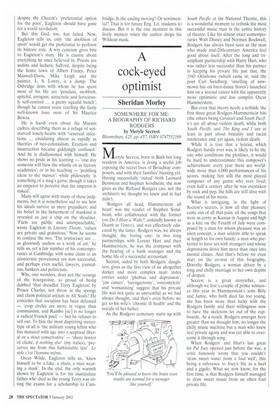A cock-eyed optimist
Sheridan Morley
SOMEWHERE FOR ME: A BIOGRAPHY OF RICHARD RODGERS by Meryle Secrest Bloomsbury, £25, pp. 457, ISBN 0747552169 Meryle Secrest, born in Bath but long resident in America, is doing a useful job exposing the secret lives of Broadway composers, and with their families' blessing yet. Having successfully 'outed' both Leonard Bernstein and Stephen Sondheim, she now gives us the Richard Rodgers (no, not the architect) we thought we knew and in fact didn't.
'Rodgers all head, Hammerstein all heart' was the verdict of Stephen Sondheim, who collaborated with the former (on Do I Hear a Waltz?, unkindly known as Dearth in Venice), and was effectively educated by the latter. Rodgers was, we always thought, the boring one: in two long partnerships with Lorenz Hart and then Hammerstein, he was the composer with the bearing of a bank manager and the home life of a successful accountant.
Secrest, aided by both Rodgers' daughters, gives us the first view of an altogether darker and more complex man: index entries under 'phobias and depression', 'jaw cancer', laryngectomy', 'osteomyletis' and 'womanising' suggest that his private life was not quite as uneventful as we had always thought, and that's even before we get to his wife's 'chronic ill health' and the suicide of her father.
As the Rodgers centenary starts up with South Pacific at the National Theatre, this is a wonderful moment to rethink the most successful music man in the entire history of theatre. Like his almost exact contemporaries Walt Disney and Norman Rockwell, Rodgers has always been seen as the man who made mid-20th-century America feel good about itself. After the long and triumphant partnership with Harry Hart, who was rather less successful than his partner in keeping his private life just that, the 1943 Oklahoma (which came in, said the poet Carl Sandberg, 'smelling of newmown hay on barn-dance floors') launched him on a second career with the apparently more optimistic and less complex Oscar Hammerstein.
But even that theory needs a rethink: the first three great Rodgers-Hammerstein hits (the others being Carousel and South Pacific) are all about violent death, while both South Pacific and The King and I are at least in part about brutality and racial intolerance and, yet again, violent death.
While it is true that a lyricist, which Rodgers hardly ever was, is likely to be the one who conditions the plotlines, it would be hard to underestimate this composer's achievement: every year there are worldwide more than 4,000 performances of his scores, making him still the most played composer of any genre who ever lived; even half a century after he was overtaken by rock and pop, the hills are still alive with the sound of his music.
What is intriguing, in the light of Secrest's secrets, is how all that pleasure came out of all that pain; all the songs that were as corny as Kansas in August and high as a kite on the Fourth of July were composed by a man for whom pleasure was an alien concept, a man seldom able to speak at length to his own family, a man who preferred to have sex with strangers and whose depressions drove him more than once into mental clinics. And that's before we even start on the co-star of this biography, Dorothy Rodgers, a woman driven by a long and chilly marriage to her own depths of despair.
Secrest is a great storyteller, and although we lost a couple of prime witnesses this year in Hammerstein's sons Billy and Jamie, who both died far too young, she has been more than lucky with the Rodgers family and their willingness now to have the skeletons let out of the cupboards. As a result, Rodgers emerges here greater than we thought him, no longer the chilly music machine but a man who knew real private agony and was yet able to overcome it through song.
When Rodgers' and Hart's last great hit Pal Joey opened just before the war, a critic famously wrote that you couldn't 'draw sweet water from a foul well', this being a reference to Joey's life as a heel and a gigolo. What we now know, for the first time, is that Rodgers himself managed to draw sweet music from an often foul private life.






















































 Previous page
Previous page